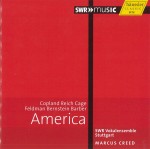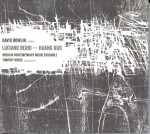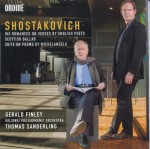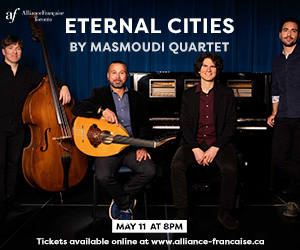 Two months ago while writing about Richard Powers’ Orfeo I mentioned that I had neglected to add Steve Reich’s Proverb to my record collection when it came out on Nonesuch in 1996 featuring Paul Hillier’s Theatre of Voices with Steve Reich and Musicians. Although that recording is now a collector’s item (but still available for download), I am pleased to note that there is a new recording which features this lush work for three soprano and two tenor voices, two vibraphones and two synthesizers (sounding vaguely like small baroque organs,) performed by the SWR Vokalensemble, Stuttgart under the direction of Marcus Creed. America (Hänssler Classic CD 93.306) also includes choral works by Aaron Copland (Four Motets), John Cage (Five), Morton Feldman (Rothko Chapel), Leonard Bernstein (Missa Brevis) and Samuel Barber (A Stopwatch and an Ordnance Map). It is an eclectic mix of mostly religious works spanning much of the 20th century. Copland’s motets date from his student days in Paris and they evidently so impressed his teacher, Nadia Boulanger, that she used them as examples for several decades. Copland himself we are told in the liner notes was less fond, declaring them “schoolboy works exhibiting some influence of Mussorgsky, whom I greatly admired back then. They may in a certain sense satisfy curiosity – people may perhaps like to know what I did as a student – but it is not really my style.” That being said, they do provide a warm and welcoming opening to the disc, albeit with occasional moments of close harmonies and dissonance, in the alternating movements of entreaty to and praise of God.
Two months ago while writing about Richard Powers’ Orfeo I mentioned that I had neglected to add Steve Reich’s Proverb to my record collection when it came out on Nonesuch in 1996 featuring Paul Hillier’s Theatre of Voices with Steve Reich and Musicians. Although that recording is now a collector’s item (but still available for download), I am pleased to note that there is a new recording which features this lush work for three soprano and two tenor voices, two vibraphones and two synthesizers (sounding vaguely like small baroque organs,) performed by the SWR Vokalensemble, Stuttgart under the direction of Marcus Creed. America (Hänssler Classic CD 93.306) also includes choral works by Aaron Copland (Four Motets), John Cage (Five), Morton Feldman (Rothko Chapel), Leonard Bernstein (Missa Brevis) and Samuel Barber (A Stopwatch and an Ordnance Map). It is an eclectic mix of mostly religious works spanning much of the 20th century. Copland’s motets date from his student days in Paris and they evidently so impressed his teacher, Nadia Boulanger, that she used them as examples for several decades. Copland himself we are told in the liner notes was less fond, declaring them “schoolboy works exhibiting some influence of Mussorgsky, whom I greatly admired back then. They may in a certain sense satisfy curiosity – people may perhaps like to know what I did as a student – but it is not really my style.” That being said, they do provide a warm and welcoming opening to the disc, albeit with occasional moments of close harmonies and dissonance, in the alternating movements of entreaty to and praise of God.
Rather than a biblical text, Reich’s Proverb draws on a sentence from the philosopher Ludwig Wittgenstein – “How small a thought it takes, to fill a whole life” – and treats it in a number of ways over the course of 14 minutes. At times reminiscent of Reich’s 1981 Tehillim, although much more subdued, it is also evocative of the organa which Perotin introduced c.1200. This is followed by a fairly late work by John Cage, Five, composed in 1988 as one of the 52 Number Pieces which occupied much of the last six years of his life. As with many of Cage’s “compositions” there is a set of instructions rather than a score per se, with many of the creative decisions left to the performers. In this case each of five actors is simply given five pitches to sing within prescribed “time brackets” and left to decide when to actually begin and end. As such the result will be different in each performance. I found this rendition mildly akin to a streamlined version of Ligeti’s Lux Aeterna made so familiar in the soundtrack of 2001: A Space Odyssey.
Morton Feldman’s piece was composed in 1971 for performance in the non-denominational of the same name in Houston, Texas designed as a place of quiet meditation, which houses 14 site-specific paintings by Mark Rothko. The music, nearly half an hour in length, scored for soprano, alto and mixed choir with one percussion (timpani, vibraphone), celesta and viola, is indeed very meditative. The singers’ ethereal vocalise can at times be mistaken for electronic textures and the instruments, especially the viola, enjoy long solo passages that are at least as important as the voices in this quiet masterpiece.
Like Cage’s Five, Bernstein’s Missa Brevis dates from 1988 and is a late work in the composer’s oeuvre. This mostly a cappella setting of the Catholic mass was written for an adaptation of Jean Anouilh’s play The Lark. Once again the voices are accompanied (intermittently) by percussion (timpani, tambourine and bells). Samuel Barber is represented by a relatively early work (1940) which is quite modern, at least in the context of this relatively conservative composer. Once again the choir is complemented by timpani – I found the preponderance of kettle drums on this choral disc to be quite striking (if you’ll excuse the pun) – and is otherwise unaccompanied. The text, lamenting the death of a soldier of the Spanish Civil War (and by extension war itself) is by Stephen Spender. I was unfamiliar with this setting and find it unlike those wonderful lyrical works by Barber with which we are normally presented. One might have expected to hear yet another rendition of Barber’s Agnus Dei (a vocal setting based on his famous Adagio) in this context, so I am particularly pleased to be presented with an atypical work rather than the expected.
For that, and a number of other reasons, this is a very strong disc, with committed performances of some rarely heard repertoire. It is interesting that it is a German choir presenting it. But that brings me to my one reservation about this release. I mentioned that this is a disc of mostly religious works, but I found the emphasis on four of the composers’ Jewish heritage in the liner notes a bit strange. Even creepy, considering that of the four, only Copland’s texts from the Old Testament can be considered Jewish. As mentioned, Reich’s is a secular philosophical quotation, Feldman’s wordless setting is meant for a non-denominational chapel and Bernstein’s is from the Catholic Church. So of what relevance is it that Copland was born “the son of Lithuanian-Jewish immigrants in Brooklyn,” Reich “born to German-Jewish parents in New York City,” Feldman “the son of Russian-Jewish immigrants in Brooklyn” or that Bernstein was “the son of Ukrainian-Jewish immigrants in Massachusetts” – especially when all we are told of Cage is that his father was an inventor and that Barber was born in Pennsylvania? At first I imagined a possible anti-(or pro)-Semitic agenda, but after discussions with a number of colleagues I have decided that it is actually just a case of lazy scholarship. I have found that if you check the Wikipedia entries for all six composers, the biographical section commences with exactly the information offered here. So unless Wikipedia is part of a larger conspiracy, I think we can accept the seeming emphasis on Jewish heritage which marred my enjoyment of this otherwise excellent disc, to be inadvertent and an editorial misjudgment.
 Italian composer Luciano Berio (1925-2003) is probably best known for his Sinfonia for orchestral forces and vocal octet with its texts by Samuel Beckett and Claude Lévi-Strauss and musical quotations from Mahler, Ravel, Stravinsky, Ives and others, and for his series of 14 Sequenzas for solo instruments. Toronto audiences had the rare opportunity to hear all 14 of these (and one of the six alternate versions as well) in January 2013 at the University of Toronto in a marathon performance organized by Joseph Petric and David Hetherington featuring some of this city’s finest musicians. The series spans Berio’s creative output from Sequenza I for flute composed in 1958 to Sequenza XIV for cello written a year before his death. About midway through, in 1976, Berio wrote his homage to the violin, an instrument of which he had “tortuous” memories as a result of his own studies as a teenager. This Sequenza VIII is based around the dissonance of the major second interval between the notes A and B and culminates in an extended ten-second long double-stopped A-B which in the words of violinist Carolin Widmann who wrote the program note for Universal Edition, which is quoted in the CD booklet, are “ten seconds of A-B which are an eternity.” Five years later Berio returned to the material of Sequenza VIII and expanded it into Corale for solo violin, two horns and strings. For this performance on the Oberlin Music label (Luciano Berio – Huang Ruo OC 14-01) violinist David Bowlin is joined by the Oberlin Contemporary Music Ensemble under the direction of Timothy Weiss in a rare opportunity to hear the two versions back to back. It is quite an exhilarating experience.
Italian composer Luciano Berio (1925-2003) is probably best known for his Sinfonia for orchestral forces and vocal octet with its texts by Samuel Beckett and Claude Lévi-Strauss and musical quotations from Mahler, Ravel, Stravinsky, Ives and others, and for his series of 14 Sequenzas for solo instruments. Toronto audiences had the rare opportunity to hear all 14 of these (and one of the six alternate versions as well) in January 2013 at the University of Toronto in a marathon performance organized by Joseph Petric and David Hetherington featuring some of this city’s finest musicians. The series spans Berio’s creative output from Sequenza I for flute composed in 1958 to Sequenza XIV for cello written a year before his death. About midway through, in 1976, Berio wrote his homage to the violin, an instrument of which he had “tortuous” memories as a result of his own studies as a teenager. This Sequenza VIII is based around the dissonance of the major second interval between the notes A and B and culminates in an extended ten-second long double-stopped A-B which in the words of violinist Carolin Widmann who wrote the program note for Universal Edition, which is quoted in the CD booklet, are “ten seconds of A-B which are an eternity.” Five years later Berio returned to the material of Sequenza VIII and expanded it into Corale for solo violin, two horns and strings. For this performance on the Oberlin Music label (Luciano Berio – Huang Ruo OC 14-01) violinist David Bowlin is joined by the Oberlin Contemporary Music Ensemble under the direction of Timothy Weiss in a rare opportunity to hear the two versions back to back. It is quite an exhilarating experience.
American-based Huang Ruo, whose website defines him as composer, conductor, pianist and folk singer, was born in China in 1976, the year the Chinese Cultural Revolution ended and, incidentally, the year Berio composed his violin Sequenza. After winning the Henry Mancini Award at the International Film and Music Festival in Switzerland in 1995, Huang moved to the USA where he did his undergraduate studies at Oberlin Conservatory and then completed masters and doctoral degrees in composition at Juilliard. We are presented with two works here, again one for violin alone and one for solo violin and large ensemble, but in this instance the composition process was reverse to that of Berio in that the Four Fragments for solo violin were extrapolated from the existing Violin Concerto No.1 “Omnipresence.” Although we are told that Huang’s music takes equal inspiration from Chinese ancient and folk music, as well as Western avant-garde, rock and jazz, I find these particular pieces to be firmly grounded in the modernist Western Art Music tradition with only occasional melodic suggestions of his homeland in the solo lines. The result is extremely effective, with none of the downfalls often associated with “hybrid” art. Soloist David Bowlin is in fine form in all of the offerings and has obviously made this repertoire his own. My only qualm about this release is the three-paneled cardboard packaging, which is simply too tight to be able to remove the disc without gripping it with fingers on the playing surface of the CD.
 I would have thought with the 40th anniversary of Shostakovich’s death just over the horizon (2015) that there would be no unearthed treasures left in his catalogue. It was therefore a pleasant surprise to receive Shostakovich – Six Romances; Scottish Ballad; Michelangelo Suite in what purported to be world premiere recordings featuring Canadian baritone Gerald Finley and the Helsinki Philharmonic Orchestra under Thomas Sanderling’s direction (Ondine ODE 1235-2). It turns out that in the case of the Six Romances on Verses by English Poets it is the version for large orchestra which had disappeared after the premiere in the 1940s that has not been recorded before. It also uses the original English texts for which Shostakovich had used Russian translations, so this is new on two counts (although conductor Sanderling had recorded the English version before using Shostakovich’s chamber orchestration). The composition dates from the same period as the Eighth Symphony and bears some resemblance to that mammoth work. To my ear it is also reminiscent of the oratorio The Song of the Forests which Shostakovich wrote in 1949. Annie Laurie, A Scottish Ballad is Shostakovich’s 1944 orchestration of an 1835 setting by Lady John Scott (Alicia Ann Spottiswoode) of William Douglas’ lament on unrequited love.
I would have thought with the 40th anniversary of Shostakovich’s death just over the horizon (2015) that there would be no unearthed treasures left in his catalogue. It was therefore a pleasant surprise to receive Shostakovich – Six Romances; Scottish Ballad; Michelangelo Suite in what purported to be world premiere recordings featuring Canadian baritone Gerald Finley and the Helsinki Philharmonic Orchestra under Thomas Sanderling’s direction (Ondine ODE 1235-2). It turns out that in the case of the Six Romances on Verses by English Poets it is the version for large orchestra which had disappeared after the premiere in the 1940s that has not been recorded before. It also uses the original English texts for which Shostakovich had used Russian translations, so this is new on two counts (although conductor Sanderling had recorded the English version before using Shostakovich’s chamber orchestration). The composition dates from the same period as the Eighth Symphony and bears some resemblance to that mammoth work. To my ear it is also reminiscent of the oratorio The Song of the Forests which Shostakovich wrote in 1949. Annie Laurie, A Scottish Ballad is Shostakovich’s 1944 orchestration of an 1835 setting by Lady John Scott (Alicia Ann Spottiswoode) of William Douglas’ lament on unrequited love.
Shostakovich wrote the Suite on Poems by Michelangelo Buonarroti for bass and piano using Russian translations in 1974, the 500th anniversary of the birth of the great Renaissance artist. Orchestrating it the following year was one of his very last projects. The orchestral version was premiered several months after his death conducted by his son Maxim. This recording uses Michelangelo’s original Italian texts and there is an extended essay by Finley in the booklet which discusses the intricate process of Setting Michelangelo to Shostakovich. Finley was obviously very involved and dedicated to this project and his fine bass-baritone voice makes the music shine. All in all, these are welcome additions to the canon.
We welcome your feedback and invite submissions. CDs and comments should be sent to: DISCoveries, WholeNote Media Inc., The Centre for Social Innovation, 503 – 720 Bathurst St. Toronto ON M5S 2R4. We also encourage you to visit our website thewholenote.com where you can find added features including direct links to performers, composers and record labels and additional, expanded and archival reviews.
David Olds, DISCoveries Editor
discoveries@thewholenote.com



